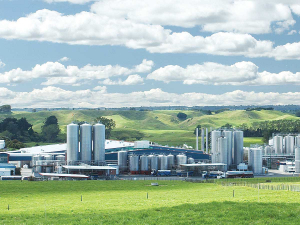Fonterra slashes forecast milk price, again
Fonterra has slashed another 50c off its milk price forecast as global milk flows shows no sign of easing.
 Fonterra says it owns 29 farms around its factories to irrigate with excess water from manufacturing plants.
Fonterra says it owns 29 farms around its factories to irrigate with excess water from manufacturing plants.
Fonterra says it is looking at the most responsible ways to take care of any excess water from manufacturing processes.
The co-operative says it cares about the environment and the communities in which it operates.
In a statement posted on its website, the co-op says it is always looking for ways to improve, and one area that’s always a focus for them is water. The co-op came under fire last week after media reports that a Cambridge couple Neville and Denise Ross discovered higher than acceptable levels of nitrates in their bore drinking water. The couple live near Fonterra’s Buxton Farm, which had been used to irrigate wastewater from the company’s Hautapu factory a few kilometres away.
Fonterra says it owns 29 farms for the primary purpose of nutrient management. Water coming from manufacturing plants is irrigated on these farms.
The co-op says each manufacturing site has different requirements in relation to water treatment and meeting its own regional limits and environmental standards.
“When managed well, we can use the treated water from our factories to help grow grass and other crops such as hemp.
“We can then harvest these crops for worthwhile uses such as making animal feed. This provides us with a nice circular model for nutrient management.
“This is the model we have in place in Hautapu where we’ve been operating a ‘cut and carry’ farm for a couple of years.”
The co-op rejects the term ‘ghost farm’ used by some media.
“You may have heard these referred to as ‘ghost farms’, as there aren’t any cows on them – but that’s not a real term,” it says.
“It’s actually that we’ve created an alternative use for this land, which enables us to grow crops, using water from our sites to provide the nutrients required for them to grow well.”
It says the treatment processes are designed to ensure the impacts on the environment are acceptable and remain within the limits set by regional councils.
But Fonterra says it is looking at improving its operations to fit with the changing landscape.
“As the land-use around our factories has changed over time and is starting to become more residential, it’s important we change our approach to nitrogen management too.
“We’re looking for ways to improve our operations to fit with the changing landscape. This is why we want to invest over the next 5 to 10 years to upgrade our waste water treatment facilities at our Hautapu, Edgecumbe, Whareroa, Maungaturoto, Te Awamutu, Longburn, Reporoa, Kapuni and Clandeboye sites.
“In the meantime, in Hautapu we’re constantly monitoring levels. When we do become aware of cases that come close to the limits, we help by offering to install filters on residents’ water supplies.
“Safe drinking water is a serious issue and it’s important to understand the science on this topic. We work closely with the regulators and science providers to ensure our wastewater operations meet the needs of the environment and the community around them.”
Mating wrapped up last month at the across-breed Beef Progeny Test on Pāmu’s Kepler Farm in Manapouri.
Libby Judson is a keeper of memories from an age gone by. Tim Fulton tells her story.
A New Zealand-first native tree study has highlighted the Bioeconomy Science Institute's position as a forestry research leader.
Hemp fibre processor Rubisco is relocating its core processing facility to Ashburton as part of a $20-$30 million expansion to leverage what it says is an accelerating global demand for sustainable and renewable fibres.
Tradition meets some of the latest in technology at the 2026 East Coast Farming Expo.
Dairy prices have jumped in the overnight Global Dairy Trade (GDT) auction, breaking a five-month negative streak.
President Donald Trump’s decision to impose tariffs on imports into the US is doing good things for global trade, according…
Seen a giant cheese roll rolling along Southland’s roads?